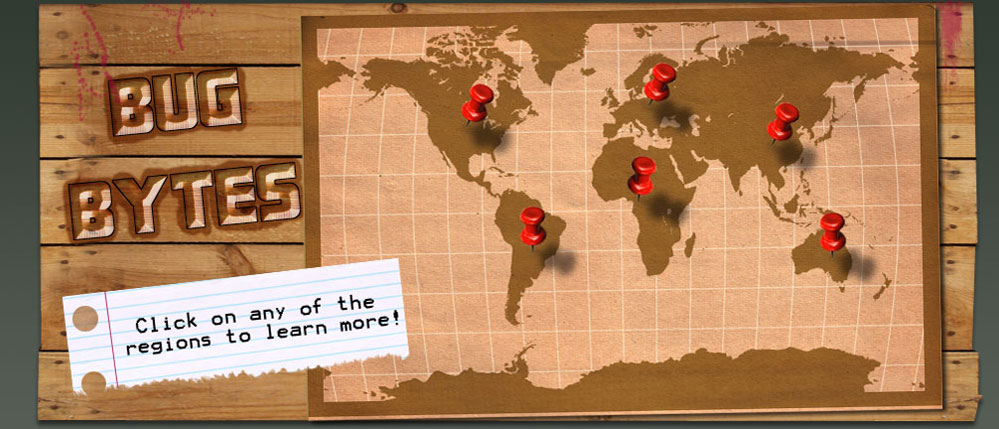Bug Bytes is a Q&A with travelers from around the world who share their stories and photos from countries they have lived in, posted every Friday. Each week will feature a different country from around the world. Want to help? Email me at travelbugjuice@gmail.com or send in photos!
This weeks’s Bug Byte comes from Krystina Lee, an expat living in Grenada while going to school to become a vet. Thanks Krys!
Bug Bytes: What part of Grenada do you live in?
Krystina Lee: Lance Aux Epines pronounced (Lance-A-peen), Grenada, West Indies. (Can you believe there are no street numbers here. Like when you call 911 or here it’s 777 you have to describe what your house looks like and where on the street it is because you can’t give them a number).
BB: How’d you end up there?
KL: I’m here going to vet school (into my 3rd semester). There’s a huge vet and medical school presence on the island (certainly a main aspect in boosting the economy here).
BB: What’s it like? weather, scenery?
KL: There is a dry season from like February to June and then rainy from July to December roughly. The scenery is just gorgeous. 40 different beaches (some with black sand) and crystal clear blue water that feels like you’re in a bathtub. There are also many waterfalls and jungle-type areas around here. I’d be surprised if there was one street on the island that didn’t have a mango tree, coconut palm papaya tree, or some other fruit growing wildly. When you drive or walk down the street you will often see peoples’ chickens and goats wandering around on the side of the road (they eat goat here a lot).
BB: What’s the best part about living in Grenada?
KL: Caribbean beaches two steps away from your house and delicious fruits growing everywhere. The people are incredibly friendly as well.
BB: What’s the biggest challenge you face?
KL: Budgeting my money would be number one. Being on an island this small, what’s not produced locally costs a million dollars. Just trips to the grocery store are a pain when you see the total (just for 2 people). Electronics and other things are taxed to the max so you can’t really get anything shipped here for cheaper either. The other problem is that getting work here is impossible and even if you could find a job you’d work for peanuts.
BB: What’s the community like? Are there a lot of expats?
KL: There is a very close knit community especially between grenadian to grenadian. Being such a small island, 14 miles by 22 miles, It seems like everywhere you go you see the same people. People are incredibly friendly. You walk down the street and everybody says good morning or good afternoon to everybody. It’s refreshing. There are quite a few expats. Mostly there are people from Europe that come to Grenada and many of them established businesses here. All the bigger businesses are mainly owned by foreigners and the smaller ones run by Grenadians. I’ve noticed a huge British presence on the island whereas I feel like not a lot of Americans know where Grenada even is. But the British know it well.
BB: What do you like to do in your spare time?
KL: I like to go to the beach. The beaches are never really crowded at all (some have no people on them at all). You can just read and relax on the beach or there are bars that line some of the beaches where locals and students always hang out at. There aren’t any waves in the Caribbean Ocean so you can just take a floating whatever and lay out in the ocean. The bars here don’t really close at all and when they do it’s usually 6 in the morning. If you like rap, R&B and the music they have here is soca which is like a reggaetone type vibe then the bars will be good for you.
BB: What’s the ‘local’ food like?
KL: Delicious but strange. “Oil down” is the big thing around here. It contains coconut milk, caliloo, pig tails, lambie (conch), plantains, bread fruit, onions (and other root vegies). Kind of a mish mash of everything and boils it all day long. It’s delicious (minus the pig tails). Lambie (conch) and caliloo are my favorites. So good. Boiled plantains surprisingly are very delicious. Like I said before people eat goat, chicken, fruits grow well. Macaroni pie is big, young papaya in cheese sauce (tastes like mac and cheese). “Provision” is what they call a dish of rice, black-eyed peas, beans, plantains. The great thing is that many locals all have home gardens so there are spots all along the roads where people will have their little farmers markets. There is a big market like that in St. George that is famous. Roti’s and samosas are big here too.
BB: Is it an expensive or cheap place to live? How much does milk cost?
KL: Depends on how you want to live. Living comfortably for me…I’d call it expensive. Things like I said before like groceries, electronics, rent are expensive. But if you don’t mind living in a shack and growing your own food (which could be very pleasant on a warm island like this) then you could live very cheaply. I’ll get back to you on the milk when I go to the grocery store.
BB: If your friends came to town (hint hint), what would you want them to see or do??
KL: Fish Friday is a must. Local restaurants and cooks bring all sorts of fish meals. It’s an outdoor event every Friday in Gouyavewhere you can eat as much fish as you can stand for hardly anything. And they also have beer and mixed drink stations and live music. It’s fun and filling. There are boat trips you can take to Fish Friday instead of driving your car too (which is nice). I would also take friends into St. George. That’s the bigger city (the capitol) on Grenada and the main port. It has a certain charm with many restaurants on the water. Definately visit some of the beaches especially Grand Anse. Go jump off the waterfalls at 7 sisters (the only way to see all 7 waterfalls is to jump all them). Grand Etang Lake is awesome and you’ll probably run into monkeys along the trip to the lake. They are called Mona Monkeys here.
———————









